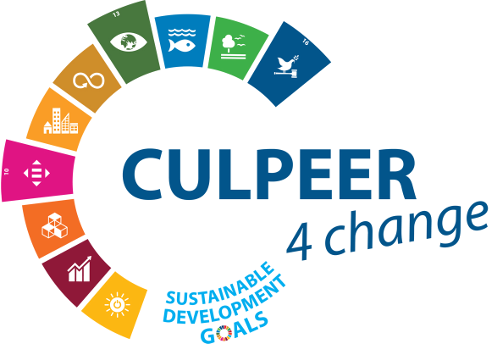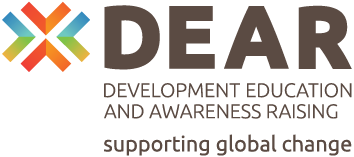At the kick-off day for the final conference we could listen to the conversation between Prof. Dr. Kersten Reich, pedagogue and didactic researcher and Antonia Vogelgsang, Project Manager at Institut equalita e.V. They discussed about which requirements needed to be fulfilled to have transformative learning processes in education. The panel discussion was facilitated by youpaN-members Inga Thao My Bui and Amelie Paassen.
Art and creative methods as tools for cultural education
The audience consisting of 15 people working in the field of education presented themselves and were involved in the conversation. Reich questioned the solution for climate protection proposed by United Nationes that invididual states should integrate in their national action plans. To achieve climate protection, we need on a long-term perspective knowledge and this can only be realised through education. Everyone needs to be able to develop a certain attitude to be part of the change.
Antonia Vogelgsang agreed on the thesis of Reich. She implied that collect, transformative learning processes are needed and need to entail a global perspective. Art and creative methods could facilitate this and build successful tools for cultural education.
What exactly needs to change in education to move towards more sustainability?
Antonia Vogelgsang explains that at the beginning needs to happen an irritation about the habits. Hereby, we should include art in these processes. Reich added that it requires reconciliation of the necessary of measures and it’s mandatory for policy to be a good example in this. The key is that each one experiences self-efficacy. Schools play a big role in enabling future generations to participate active in society.
Fridays for Future as a good example for sustainable development
Education for sustainable development is still not obligatory in Germany. The question depends on the federal states. Germany is not a good example in comparison to the Scandinavian countries, Germany can learn from them, replies Reich. He criticized the paradox life habits of humans and stated the lobbying work in Germany as a huge scandal. A positive example for him is the movement Fridays for future, which acts on the sustainable development goals. They bring hope for cultural and social change. For Antonia Vogelgsang it’s important to combine education for sustainable development and cultural education to achieve cultural and social change.
Reich insists on exchange about perspectives
At the end of the discussion the panelists proposed possible solutions how education for sustainable development can be integrated in Germany. The approach of Finland ‚phenomenon lessons‘ is very interesting for Reich. The school subjects will be dismantled and developed further to become more interdisciplinary projects. He insists on participating in exchanges between friends, families, and strangers.
The debate involved the participants in the end and built the closure of the panel discussion.


